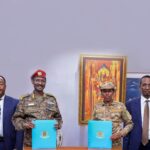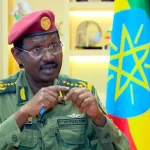MOGADISHU, Somalia – In a surprising turn of events, former President Mohamed Abdullahi Farmajo has emerged as one of the opponents against the decisions made at the recent National Consultative Council (NCC) meeting in Mogadishu.
This comes after a joint communiqué by prominent political figures, including former President Sheikh Sharif Sheikh Ahmed, former Prime Ministers Omar Abdirashid Sharmarke, Hassan Ali Kheire, and Abdiwali Ali Gaas, as well as former South West President Sharif Hassan Sheikh Adan and Dr. Abdinur Sheikh Mohamed, among others, expressed their opposition to the Council’s decisions.
The political leaders argue that several provisions issued by the National Consultative Council violate the country’s laws and the existing power-sharing agreement that the Somali people have previously endorsed.
A particular point of contention is the term extension for the heads of the federal and regional governments. In light of these issues, the politicians have appealed to the country’s leaders to prioritize the fight against Al Shabaab and avoid any political measures that may impede progress.
In contrast to the widespread opposition, Farmajo has voiced his support for the decisions of the National Consultative Council meeting, particularly regarding the country’s elections. In a statement posted on Facebook, Farmajo welcomed the electoral agreement establishing a one-person-one-vote system, ensuring the direct election of a president and a vice president.
This move is seen as a significant step towards universal suffrage in Somalia, aiming to give the Somali people a more direct role in choosing their leaders.
As part of the reshaping of Somalia’s political architecture, the leaders of the Council also endorsed eliminating the Prime Minister’s role in favor of a presidential system. Farmajo’s support for the NCC decisions comes at a time when the political landscape in Somalia is undergoing significant changes, with various stakeholders vying for influence and control.
The nation faces critical challenges in navigating constitutional amendments, power-sharing arrangements, and the transition to direct voting, all of which will shape the future governance of Somalia.
While Farmajo stands alone in his support for the NCC meeting outcome, the opposition from other political leaders underscores the need for a more inclusive and consensual approach to constitutional changes and electoral reforms.
As Somalia continues to grapple with political instability and security challenges, the international community has been closely monitoring the situation, with many expressing their support for a peaceful and democratic transition.
In the meantime, the focus will be on ensuring that the electoral process is free, fair, and transparent, and that the voice of the Somali people is heard loud and clear. As the nation awaits further developments, the hope remains that the political leaders will find common ground and work together towards a more stable and prosperous future for Somalia.





